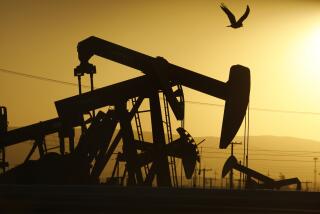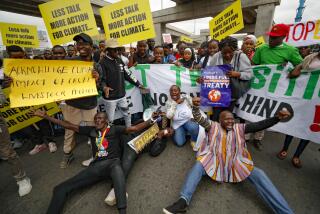Africa most vulnerable to effects of global warming, U.N. says
- Share via
JOHANNESBURG, SOUTH AFRICA — Africa produces a tiny fraction of the world’s greenhouse gases but is particularly vulnerable to the effects of global warming, U.N. environmental experts said Tuesday at a conference of African environment ministers here.
Some of those present had harsh words for the developed world, in particular the United States, the largest producer of greenhouse gases. They said industrialized nations are pressing Africans to reduce gas emissions while not doing enough themselves.
“Computer models project major changes in precipitation patterns on the continent, which could lead to food shortages and increased desertification,” says a United Nations Environment Program report released at the conference. “Yet on the whole, African nations lack the resources and technology to address such changes.”
Africa, which produces less than 4% of global greenhouse gases, has seen glaciers shrink and lakes evaporate. Poor environmental practices on the continent, including deforestation in countries such as the Democratic Republic of Congo, are complicating the challenges Africa will face as global warming undermines agriculture and leads to further desertification and erosion.
“Africa is one of the continents least responsible for climate change and is also least able to afford the costs of adaptation,” said South African Environment Minister Marthinus Van Schalkwyk. “Africa will remain vulnerable even if, globally, emissions peak and decline in the next 10 to 15 years.”
He said developed nations should not demand that Africa reduce greenhouse emissions by 50% by 2020, as many have done, unless they are willing to commit to cutting their own emissions by 25% to 40%.
The report released Tuesday provides before and after satellite images of the continent illustrating the dramatic environmental degradation.
Glaciers on Mt. Kilimanjaro in Tanzania and the Rwenzori mountains in Uganda have shrunk 50% since the late 1980s. Scientists estimate the Rwenzori glaciers will be gone in 20 years.
Lake Chad, which was once the second-largest wetland in Africa and supports 20 million people, is down to 5% of its size in 1973.
The report says forests, which cover 20% of Africa, are disappearing faster in Africa than on any other continent. Deforestation is a major concern in 35 African nations. The continent accounts for 15,500 square miles of the 50,000 square miles of forest lost globally each year.
“If we let things go on as they are, it is going to have a catastrophic effect on humanity,” said Andre Okombi Salissa, environmental minister of the Republic of Congo and president of the African Ministerial Conference on the Environment.
He called on the U.S. to cut its greenhouse emissions.
“Many times people think that Africans don’t know how to look after the environment because they’re not literate,” said Salissa. “But often they do know how to look after the environment and the developed countries do not. We need to look at this hypocrisy.”
--
More to Read
Sign up for Essential California
The most important California stories and recommendations in your inbox every morning.
You may occasionally receive promotional content from the Los Angeles Times.










